|
Books Should Be Free Loyal Books Free Public Domain Audiobooks & eBook Downloads |
|
|
Books Should Be Free Loyal Books Free Public Domain Audiobooks & eBook Downloads |
|
Top Authors |
|---|
|
Book type:
Sort by:
|
By: Lafcadio Hearn (1850-1904) | |
|---|---|
 In Ghostly Japan
In Ghostly Japan
This collection of 14 stories collected by Lafcadio Hearn, contains Japanese ghost stories, but also several non-fiction pieces. Hearn tries to give a glimpse into the customs of the Japanese, by giving examples of Buddhist Proverbs and explaining the use of incense and the nation wide fascination with poetry. Furthermore, he has again translated several hair-rising ghost stories, like "A Passional Karma" about the truly undying love of a young couple. | |
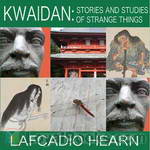 Kwaidan: Stories and Studies of Strange Things
Kwaidan: Stories and Studies of Strange Things
Most of the following Kwaidan, or Weird Tales, have been taken from old Japanese books,— such as the Yaso-Kidan, Bukkyo-Hyakkwa-Zensho, Kokon-Chomonshu, Tama-Sudare, and Hyaku-Monogatari. Some of the stories may have had a Chinese origin: the very remarkable "Dream of Akinosuke," for example, is certainly from a Chinese source. But the story-teller, in every case, has so recolored and reshaped his borrowing as to naturalize it… One queer tale, "Yuki-Onna," was told me by a farmer of Chofu, Nishitama-gori, in Musashi province, as a legend of his native village... | |
 Kottō : being Japanese curios, with sundry cobwebs
Kottō : being Japanese curios, with sundry cobwebs
Kottō contains 20 Japanese stories, collected from different sources and translated by Lafcadio Hearn. The types of stories in this collection are widespread: There are old ghost stories Hearn is best known for (The Legend of Yurei-Daki), his own observations and musings (Pathological), as well as the translation of 'A Woman's Diary', a touching account of the life of the poorer classes in Tokyo, written at the end of the 19th century. | |
 Kokoro: Hints and Echoes of Japanese Inner Life
Kokoro: Hints and Echoes of Japanese Inner Life
In an introductory paragraph, Lafcadio Hearn declares his intention: "The papers composing this volume treat of the inner rather than of the outer life of Japan, for which reason they have been grouped under the title Kokoro (heart). Written with the above character, this word signifies also mind, in the emotional sense; spirit; courage; resolve; sentiment; affection; and inner meaning, just as we say in English, "the heart of things."" The result is a highly eclectic collection of stories, diary... | |
 The Romance of the Milky Way And Other Studies & Stories
The Romance of the Milky Way And Other Studies & Stories
| |
 Chita: a Memory of Last Island
Chita: a Memory of Last Island
| |
 Japan: An Attempt at Interpretation
Japan: An Attempt at Interpretation
Greece-born Lafcadio Hearn (1850 - 1904) spent decades of his life in Japan, even marrying a Japanese woman, thus becoming a Japanese citizen by the name of Koizumi Yakumo (小泉 八雲). He wrote many books on Japan, especially about its folklore. In this posthumously published book, he takes a closer look at Japan's religious history: How it developed from ancient beliefs into Shintoism, resisted suppression attempts by both Buddhism and Christianity and how – despite efforts to westernise Japan during the era known as Meiji Restoration – it remained the basis for Japanese society... | |
 Glimpses of Unfamiliar Japan Second Series
Glimpses of Unfamiliar Japan Second Series
| |
 Two Years in the French West Indies
Two Years in the French West Indies
| |
 Books and Habits, from the Lectures of Lafcadio Hearn
Books and Habits, from the Lectures of Lafcadio Hearn
| |
By: Harry Bates, Editor | |
|---|---|
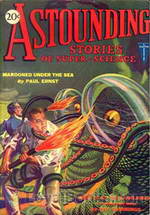 Astounding Stories of Super-Science, September 1930
Astounding Stories of Super-Science, September 1930
This is a collection of short science fiction stories by various writers, circa 1930. Writers include Paul Ernst, Miles Breuer, Ray Cummings, Sewell Wright, and others. | |
By: Chretien de Troyes (fl. 12th cent. C.E.) | |
|---|---|
 Yvain, or the Knight with the Lion
Yvain, or the Knight with the Lion
Yvain, the Knight of the Lion is a romance by Chrétien de Troyes. It was probably written in the 1170s simultaneously with Lancelot, the Knight of the Cart, and includes several references to the action in that poem. In the poem, Yvain seeks to avenge his cousin Calogrenant who had been defeated by an otherworldly knight beside a magical storm-making fountain in the forest of Broceliande. | |
 Erec and Enide
Erec and Enide
A medieval romance in which Erec goes through many trials until he is sure of Enide’s loyalty and true love | |
By: Richard Marsh | |
|---|---|
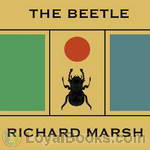 The Beetle
The Beetle
A story about a mysterious oriental figure who pursues a British politician to London, where he wreaks havoc with his powers of hypnosis and shape-shifting, Marsh’s novel is of a piece with other sensational turn-of-the-century fictions such as Stoker’s Dracula, George du Maurier’s Trilby, and Sax Rohmer’s Fu Manchu novels. Like Dracula and many of the sensation novels pioneered by Wilkie Collins and others in the 1860s, The Beetle is narrated from the perspectives of multiple characters,... | |
By: Charles Miner Thompson (1864-1941) | |
|---|---|
 The Calico Cat
The Calico Cat
The consequences of letting your irritation get the better of you are humorously portrayed in this story of a self-important man who fires a shotgun at an annoying cat on his fence.. and hits a man skulking in the bushes. What did the cat do to enrage him? Why was the man in the bushes? And how can the whole matter be covered up and done away with before the neighbors start gossiping? | |
By: British Parliament | |
|---|---|
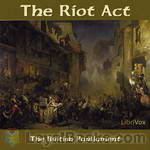 The Riot Act
The Riot Act
The Riot Act was passed by the British Parliament in 1714, the first year of the reign of George I, and came into effect in August 1715. This was a time of widespread social disturbance, as the preamble describes; the Act sought to put an end to this. A group of twelve or more people, “being unlawfully, riotously and tumultuously assembled”, would be read a proclamation; they must disperse within an hour, on pain of death. The same fate would befall anyone preventing the reading of the proclamation, or damaging buildings while on a riot... | |
By: Anton Chekhov (1860-1904) | |
|---|---|
 Swan Song
Swan Song
In 'The Swan Song' an aging actor reminisces about his life and the parts he's played. The piece takes a tragic look at ambition and the sacrifices that must be made in order to succeed. Chekhov’s ability to capture and explore human nature and experience is showcased here. | |
 Lady With the Dog and Other Stories
Lady With the Dog and Other Stories
Anton Chekhov was a Russian physician, dramatist and author who is considered to be among the greatest writers of short stories in history. His career as a dramatist produced four classics and his best short stories are held in high esteem by writers and critics. Chekhov practiced as a doctor throughout most of his literary career: "Medicine is my lawful wife", he once said, "and literature is my mistress." Chekhov had at first written stories only for financial gain, but as his artistic ambition grew, he made formal innovations which have influenced the evolution of the modern short story... | |
 The Wife, and other stories
The Wife, and other stories
| |
 The Witch and other stories
The Witch and other stories
| |
 The Bishop and Other Stories
The Bishop and Other Stories
| |
 The Schoolmistress, and other stories
The Schoolmistress, and other stories
| |
 Letters of Anton Chekhov
Letters of Anton Chekhov
| |
 House With The Mezzanine And Other Stories
House With The Mezzanine And Other Stories
Six short stories and a novella by the Russian master. (david wales) | |
 Ward No. 6
Ward No. 6
The line between sanity and insanity is blurred in this classic novella by Anton Chekhov. The disillusioned idealist Dr. Rabin is in charge of a provincial lunatic asylum, overseeing with weary, dubious policies a motley group of patients, a group that mirrors in microcosm all of human and especially Russian society. Seeking answers to profound questions, Dr. Rabin enters into dialogues with both staff members and patients, trying to make sense out of what has become of his life, until it becomes less and less clear who is the doctor and who is the patient... | |
 Kashtanka
Kashtanka
"Kashtanka," a shaggy-dog story penned by Anton Chekhov in seven parts and first published in 1887, relates the experiences of its eponymous heroine, a fox-faced, reddish dachshund-mix, whose name means 'little chestnut.' After her detestation of music causes her to become separated from the carpenter with whose family she had been living, Kashtanka finds herself taken up by an unusual vaudevillian and goes to live among an assortment of other intelligent animals, each of whom is observed with the characteristic empathy and humor that stamp Chekhov's work. | |
 Ivanov
Ivanov
Nicolai (anglicised Nicholas in this translation) Ivanov, a middle-aged public servant, is unhappy. His wife Anna, disinherited by her family after converting from Judaism, is dying of tuberculosis. He is deeply in debt. And his best friend’s daughter is infatuated with him. Comedy and tragedy ensue in truly Chekhovian fashion. An example of the young Chekhov’s maturing style, Ivanov is an early harbinger of themes that would recur throughout his work. | |
 Note-Book of Anton Chekhov
Note-Book of Anton Chekhov
| |
 Love
Love
| |
 Schoolmaster and Other Stories
Schoolmaster and Other Stories
Anton Chekhov, perhaps better known as a world famous classical playwright for works such as "Uncle Vanya" and "The Cherry Orchard" was also a prolific short story writer. "The Schoolmaster and Other Stories" is one of several of his collections. It's a compilation of 30 short stories. Some bizarre, some comical but all very interesting. | |
 The Party
The Party
| |
 The Slanderer 1901
The Slanderer 1901
| |
By: Harold W. Fairbanks (1860-1952) | |
|---|---|
 The Western United States: A Geographical Reader
The Western United States: A Geographical Reader
“In preparation of this book the author has had in mind the needs of the upper grammar grades. The subject matter has not been selected with the object of covering the field of Western geography in a systematic manner, but instead the attempt has been made to picture as graphically as may be some of its more striking and interesting physical features, and the influence which these features have exerted upon its discovery and settlement.” (from the Preface of The Western United States) | |
By: United States Arms Control and Disarmament Agency | |
|---|---|
 Worldwide Effects of Nuclear War: Some Perspectives
Worldwide Effects of Nuclear War: Some Perspectives
This is a concise yet thorough explanation of what might happen to our world in the aftermath of a nuclear war. The myriad of potential effects will be global and wide-spread, and the potentials are glazed over in this short work. | |
By: Carlton McCarthy (1847-1936) | |
|---|---|
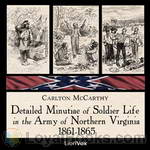 Detailed Minutiae of Soldier Life in the Army of Northern Virginia, 1861-1865
Detailed Minutiae of Soldier Life in the Army of Northern Virginia, 1861-1865
The author, who fought as a private in the Army of Northern Virginia during the Civil War, describes the Confederate soldier’s daily struggles with hunger, illness, fear, and the perils of combat; as well as his pride of service, love of comrades, and courage in the face of overwhelming odds | |
By: Abbie Farwell Brown | |
|---|---|
 The Christmas Angel
The Christmas Angel
Disagreeable old Miss Terry spends her Christmas Eve getting rid of toys from her childhood toy box. One by one she tosses them onto the sidewalk in front of her house, then secretly watches the little scenes that occur, which seem to confirm her belief that true Christmas spirit does not exist. Then the Angel from her childhood Christmas tree appears to show Miss Terry that she has not yet witnessed the final act of each of those little dramas...Living Age magazine in 1910 observed of The Christmas... | |
 Curious Book of Birds
Curious Book of Birds
Now the interesting facts about birds we have always with us. We can find them out for ourselves, which is a very pleasant thing to do, or we can take the word of others, of which there is no lack. But it is the quaint fancies about birds which are in danger of being lost. The long-time fancies which the world's children in all lands have been taught are quite as important as the every-day facts. They show what the little feathered brothers have been to the children of men; how we have come to like some and to dislike others as we do; why the poets have called them by certain nicknames which we ought to know; and why a great many strange things are so, in the minds of childlike people. | |
 The Flower Princess The Flower Princess; The Little Friend; The Mermaid's Child; The Ten Blowers
The Flower Princess The Flower Princess; The Little Friend; The Mermaid's Child; The Ten Blowers
| |
 John of the Woods
John of the Woods
| |
By: Octavus Roy Cohen (1891-1959) | |
|---|---|
 Midnight
Midnight
The crime seemed to have lost itself in the sleety cold of the December midnight upon which it was committed. The trails were not blind–there were simply no trails. The circumstances baffled explanation–a lone woman entering an empty taxicab; a run to a distant point in the city; the discovery of the woman’s disappearance, and in her stead the sight of the dead body of a prominent society man–that, and the further blind information that the suit-case which the woman had carried was the property of the man whose body was huddled horribly in the taxicab. | |
By: John L. Cotter (1911-1999) | |
|---|---|
 New Discoveries at Jamestown
New Discoveries at Jamestown
Chances are, you are reading this because you are aware that Jamestown, Virginia, celebrated its 400th birthday in 2007. It was the first “successful” English settlement in America. Although the colonists eventually moved upriver to be quit of the hard luck and difficult conditions on the small island, they left behind a trove of possessions – used, worn out, or forgotten. Did you ever stop to consider just how many different items you have, need, or use, to live, work, and amuse yourself? Chances are that you would seriously underestimate! But once you put such a list together, another person could tell quite a story about the life you lead... | |